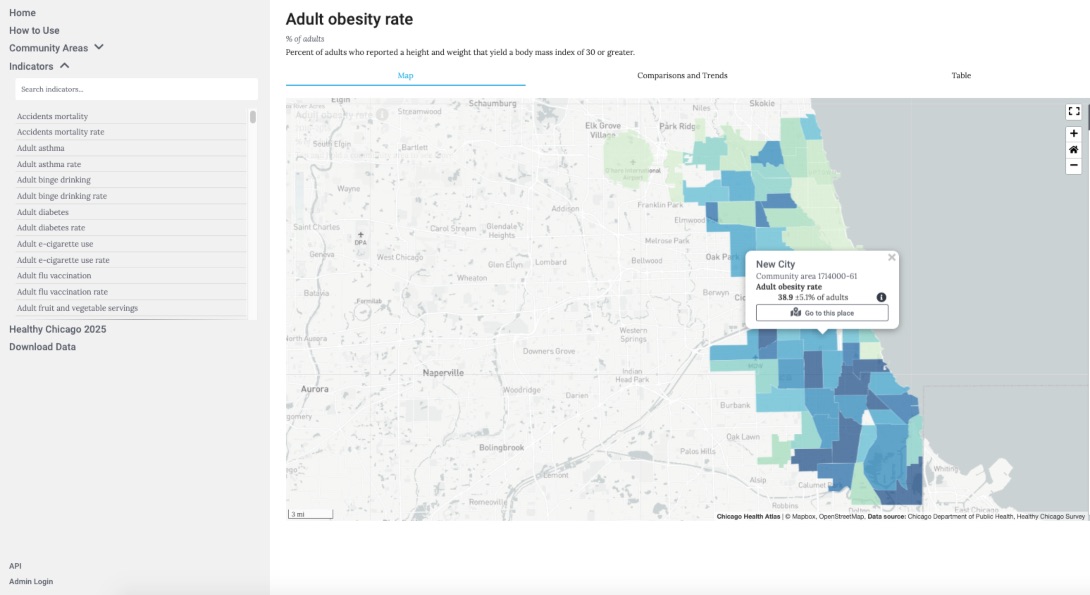Chicago’s health database moves to UIC

Story text
Today, the Chicago Health Atlas will move from its home at City Tech Collaborative to the University of Illinois Chicago School of Public Health, which will further extend the Atlas’ reach and impact.
The Chicago Health Atlas — which is managed through a partnership between UIC’s School of Public Health, Metopio, and the Chicago Department of Public Health — is a free community health data resource that residents, community organizations and public health stakeholders can use to easily search, analyze and download neighborhood-level health data for Chicago’s 77 community areas.
To date, Chicago Health Atlas datasets have been accessed by more than 150,000 new users.
“UIC is proud to serve Chicago, its communities and its public health students, researchers, advocates and policymakers by taking on the Atlas and expanding its capabilities and reach,” said Wayne Giles, MD, MS, dean of the UIC School of Public Health. “Policies that impact public health are only as good as data that informs them, and the Chicago Health Atlas is among our greatest assets in Chicago for understanding the needs of our communities.”
“Since its creation, the Chicago Health Atlas has empowered individuals and organizations to understand and take action on the many interrelated factors that influence our communities’ health and wellness as well as the health disparities affecting residents,” said Brenna Berman, CEO of City Tech Collaborative. “I am confident that the UIC School of Public Health is the best organization to carry this mission forward and put information directly in the hands of those who need it most.”
The transition of the Chicago Health Atlas to UIC coincides with its move to a new platform and launch of advanced capabilities that will provide more tools for users. The School of Public Health’s recently launched Population Health Analytics, Metrics, and Evaluation, or PHAME, Center, spearheaded the updates and will oversee the Atlas going forward alongside the CDPH Office of Epidemiology.
Updates will include increased community engagement opportunities as well as advanced analytics capabilities and enhanced data visualizations. The new interface, which is powered by Metopio, will make it easier for anyone to use data to understand health disparities and drive change regardless of their data science experience.
“When users visit the Chicago Health Atlas they will now have more tools at their fingertips to understand what is happening in the city and to tackle equity and health issues. We’ve added advanced analytics capabilities that allow users to better explore the associations between multiple factors; enhanced visuals, such as hot spot analysis tools, that can help illustrate spatial patterns and clusters of data; and we are committed to community engagement in data utilization,” said Sage Kim, PhD, associate professor of health policy and administration at the UIC School of Public Health and co-leader of the PHAME Center.
“The data in the Chicago Health Atlas is valuable and powerful. We believe the integration of hyperlocal data, analytics and scholarship in the enhanced Atlas will provide users with new, actionable insights and context, which is absolutely critical for making the data more accessible and meaningful to more people. In essence, the Atlas and these updates are all about the democratization of data,” said Sanjib Basu, PhD, the Paul Levy and Virginia F. Tomasek Professor of Biostatistics at the UIC School of Public Health and co-leader of the PHAME Center.
“The Chicago Health Atlas continues to be a key resource to aggregate, understand, and share critical health information for Chicago residents and communities,” said CDPH Commissioner Allison Arwady, MD. “As we have seen so clearly during the COVID-19 pandemic, open data resources are vital not only for public health officials, but also for the grassroots organizations and individuals responding to immediate and long-term health issues in their communities. With the PHAME Center, we are excited to channel the public’s enthusiasm for data toward broader efforts to improve the city’s health.”
The PHAME Center was established in 2020 with an award from the Otho S. A. Sprague Memorial Institute to support the Chicago Health Atlas, CDPH’s Healthy Chicago initiatives, and similar efforts to make health and wellness data useful to all.
“Since the institute’s initial grant to the Chicago Department of Public Health in early 2000, the Chicago Health Atlas has continuously evolved. It has been enriched by each successive manager. In 2012, the Smart Chicago Collaborative provided important new dimensions. Since 2017 their work was enhanced by the City Tech Collaborative team. With the creation of the PHAME Center in 2020 and their stewardship of the Atlas, the institute is optimistic that the multidisciplinary skills of campus faculty, students and researchers will make the Atlas an ever-more useful resource,” said James Alexander, executive director of the Otho S. A. Sprague Memorial Institute.
For nearly 10 years, the Chicago Health Atlas has created opportunities for learning and action on more than 160 public health indicators and datasets from more than 30 participating health care, community, and research partners, including CDPH, MAPSCorps, and the Sinai Urban Health Institute. The Atlas includes critical health and wellness information such as available affordable housing units, grocery store density, the Chicago Department of Family & Support Services resources, and air quality data. A key source in understanding complex health issues and how they affect different communities, the Atlas provides information on the opioid epidemic and the latest COVID-19 data including testing locations, data on underlying conditions tied to the virus, and a map of essential businesses by ZIP code.